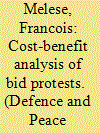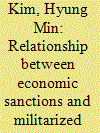|
|
|
Sort Order |
|
|
|
Items / Page
|
|
|
|
|
|
|
| Srl | Item |
| 1 |
ID:
172773


|
|
|
|
|
| Summary/Abstract |
The goal of any procurement process is to obtain ‘value for money.’ Bid protest systems are intended to help. The U.S. Department of Defense, NATO, the EU, UN, OECD, and WTO, all authorize losing bidders to protest public procurements. The threat of a protest is meant to increase government accountability, and encourage vendor participation. An extensive legal and regulatory literature discusses intended benefits of protests, but is surprisingly silent about the costs. The goal of this study is to examine both costs and benefits. Military acquisition offers an illustration. The dual objective is to minimize corruption, and maximize competition. Sadly, protest systems can inadvertently discourage both. Moreover, past protests by defense companies have generated significant costs, and triggered dangerous delays of critical defense equipment, materiel, services, and supplies required for national security. The static, probabilistic, micro-economic, partial equilibrium, representative bidder model presented in this paper offers a cautionary tale for defense organizations, government agencies, countries, and international institutions that authorize bid protests. The model reveals multiple potential deficiencies of protest systems, and recommends analysis of portfolios of alternatives to eliminate fraud and favoritism, and increase competition, to improve procurement outcomes.
|
|
|
|
|
|
|
|
|
|
|
|
|
|
|
|
| 2 |
ID:
172771


|
|
|
|
|
| Summary/Abstract |
In many European countries established leftwing and rightwing parties have been threatened by policy convergence and, in turn, new populist parties that offer more polarized platforms. I investigate whether government ideology influences dragnet-controls – controls of persons conducted by the police without having any suspicion that the controlled person committed a crime. They took effect after the Schengen Agreement in 1995. I propose dragnet-controls to be a prime example of ideology-induced policies implemented by established parties. Dragnet-controls confine citizens’ liberties, but may help to detect criminals. Using data from the 16 German states over the period 1995–2017, I show that rightwing governments have been active in implementing dragnet-controls and leftwing governments have denied dragnet-controls since the mid 1990s. When evaluating how government/party ideology influences individual policies, previous econometric studies ignored initiatives in parliament. My study also considers initiatives in parliament. I conjecture that, since 2015, the rightwing CDU has used initiatives to introduce/extend dragnet-controls to also deal with the upcoming threat of rightwing populism. Future research should examine policy-differences between the established parties regarding more fine-grained policy measures also in other European countries.
|
|
|
|
|
|
|
|
|
|
|
|
|
|
|
|
| 3 |
ID:
172783


|
|
|
|
|
| Summary/Abstract |
This study examines the causal nexus between defense expenditure and economic growth in China using the bootstrap Granger full-sample causality test and rolling-window estimation. The full-sample result indicates a positive bidirectional causality between economic growth and defense expenditure, suggesting that more defense spending increases economic growth, and vice versa. By adopting a time-varying rolling-window approach to revisit the dynamic causal relationships, this article identifies that the causality changes over time. We find significant positive short-run causality running from economic growth to defense expenditure in most of the time investigated, thus implying that economic growth stimulates defense expenditure. However, large-scale disarmaments break such positive linkage. Conversely, both positive and negative effects of defense expenditure on economic growth are demonstrated, showing that more defense spending has ambiguous effect on economy. Consequently, economic growth mainly drives defense expenditure rather than the other way around. The impact of defense expenditure in China on national economy is affected by multiplier effect and crowding-out effect as well as institutional factors.
|
|
|
|
|
|
|
|
|
|
|
|
|
|
|
|
| 4 |
ID:
172777


|
|
|
|
|
| Summary/Abstract |
The article deals with an empirical investigation of the determinants of military expenditures of selected NATO countries. Economic, security, and political determinants were analysed by means of panel models. In order to analyse the economic environment as a determinant of military expenditure, the following variables were applied: Risk of Budget Balance, Risk of Foreign Debt, Risk of Inflation, Risk of GDP per Capita, Risk of GDP Growth, and a control variable, Risk of Current Account as a percentage of GDP. The following variables were employed for the security risk analysis: Terrorism, Cross Border Conflict, Ethnic Tension, and Foreign Pressures. A variable evaluating the Democratic Accountability and a control variable Government Stability were selected to analyse political risks. The results show serious inconsistencies in factors affecting the military expenditures of traditional and new NATO member countries.
|
|
|
|
|
|
|
|
|
|
|
|
|
|
|
|
| 5 |
ID:
172782


|
|
|
|
|
| Summary/Abstract |
The paper examines the effects of geopolitical risks, measured by a new index for geopolitical risk, on general government investment (gross fixed capital formation). It uses panel data for 18 countries for the period from 1985 to 2015. Using panel fixed-effects and the corrected least squares dummy variable estimators, results indicate that geopolitical risks seem to exert a positive effect on government investment.
|
|
|
|
|
|
|
|
|
|
|
|
|
|
|
|
| 6 |
ID:
172770


|
|
|
|
|
| Summary/Abstract |
We explore the supply side of the market for suicide attackers. While the strategic edge of suicide attacks for certain terrorist organizations has been thoroughly explored, the motivation of the suppliers remains quite mysterious. We develop a model of the supply of suicide attacks, the motivation of which is expressive but time inconsistent. The model implies terrorist organizations to provide a commitment device in exchange for the ‘services’ of those suicide attackers that do not suffer from any mental or physical burden of life. By contrast, suicide attackers that do suffer from some sufficiently severe burden of life are not reliant on any commitment device and should therefore be expected to more frequently act as lonesome-wolf attackers.
|
|
|
|
|
|
|
|
|
|
|
|
|
|
|
|
| 7 |
ID:
172780


|
|
|
|
|
| Summary/Abstract |
This research empirically examines the relationship between economic sanctions and militarized conflicts for the period 1945–2001. The collective security principles of the League of Nations (after WWI) and the United Nations (after WWII) are based on the sequential imposition of economic and militarized sanctions against states that violate international rules and regulations. A recent example is the international sanctions imposed on North Korea in response to its nuclear weapons testing and ballistic missile development. Theoretical arguments in the field of international relations suggest that economic sanctions lead to militarized tensions and conflicts among states. In this research, we argue that the relationship between economic sanctions and military conflict is two-way (i.e. sanctions cause conflict, and conflict causes sanctions) rather than one-way. Using sanctions data (Threat and Imposition of Sanctions v4.0) and conflict data (Correlates of War Militarized Interstate Disputes v4.2; International Crisis Behavior v12), we find that the relationship is mutually causative. The involvement of economic sanctions causes the onset of militarized conflict, and vice versa.
|
|
|
|
|
|
|
|
|
|
|
|
|
|
|
|
| 8 |
ID:
172786


|
|
|
|
|
| Summary/Abstract |
This paper discusses neutrality as a changing concept in international relations; the origin and characteristics of Serbia’s military neutrality; as well as the country’s general economic background and its defence spending. The paper also compares Serbian defence expenditure with the defence expenditure of the European members of the North American Treaty Organisation (NATO), members of the Eurasian and Russia-based Collective Security Treaty Organisation (CSTO) and traditionally neutral countries in Europe. The paper explores how Serbia’s current policy of military neutrality, while maintaining operational links with other military organisations in Europe, has had a positive impact on the Serbian economy in general.
|
|
|
|
|
|
|
|
|
|
|
|
|
|
|
|
|
|
|
|
|